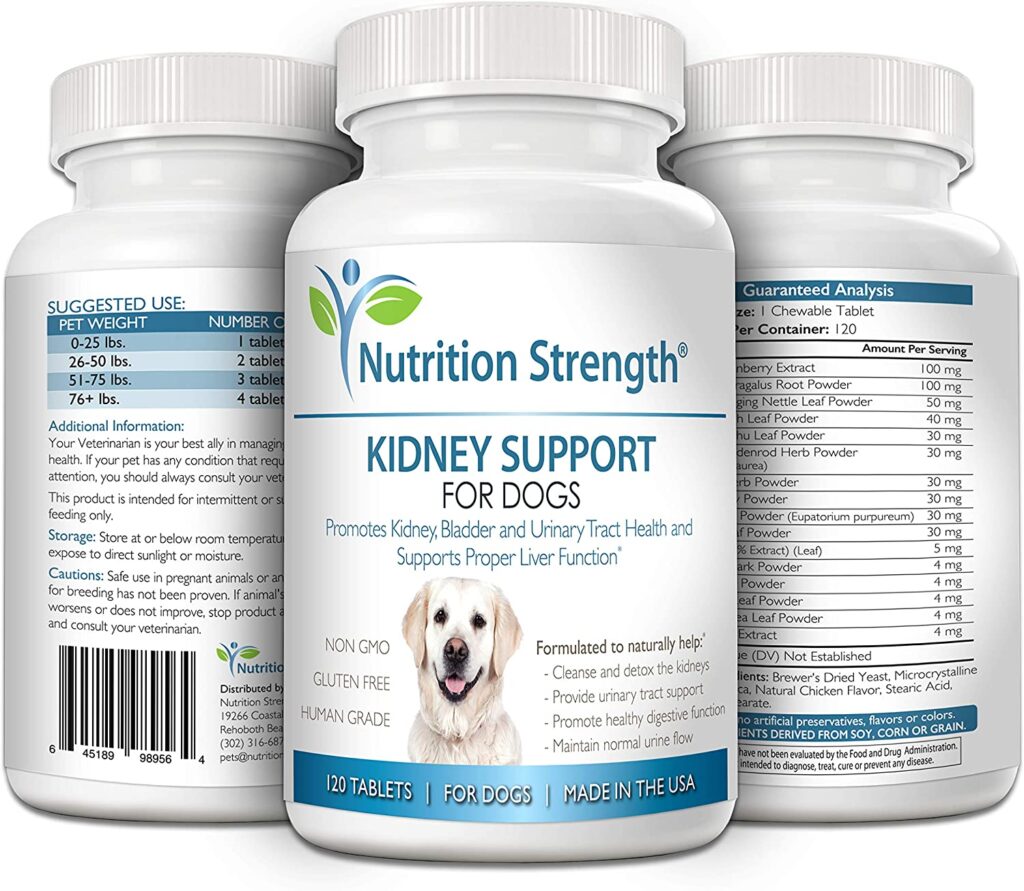Kidney Support for Dogs: How You Can Help Your Pet
Kidney support for dogs is always a good idea, as many of our pets suffer from chronic renal disease. Often, it entails switching to a meal formulated particularly for dogs with renal problems.
Below we will examine what kidney disease is, list the symptoms your dog’s kidneys may suffer, and review various treatment options, including food changes.
We will also discuss some of the best available dog meals for dogs with renal illness, which may benefit your pet as well. Let’s get started.
Table of Contents
- What Is Kidney Disease in Dogs?
- Characteristics of Foods for Dogs with Kidney Disease
- Best Dog Foods for Kidney Disease
- Benefits of a Renal Diet for Dogs
- The Takeaway
- Nutrition Strength Kidney Support for Dogs
Check out our Nutrition Strength Kidney Support for Dogs here.
What Is Kidney Disease in Dogs?
Your dog’s kidneys function as a filtration mechanism and aid in maintaining his body’s equilibrium. This contains a wide variety of duties, but some of the most significant are:
- Filtering waste products from the bloodstream. The kidneys filter waste products from the bloodstream and dispose of them via your dog’s urine.
- Maintaining water and mineral concentration levels. Kidneys aid in the maintenance of the body’s salt and water balance. If your dog’s bodily fluids are now overly diluted, the kidneys may instruct the body to excrete more pee.
- Controlling the blood pressure. Kidneys help to keep blood pressure in check by assisting in calcium metabolism, maintaining proper phosphorus levels, and managing the quantity of water in the body.
- Producing hormones. The kidneys create hormones stimulating red blood cell synthesis, which aids oxygen transport throughout the body.
Renal illness manifests in two types. They are acute kidney disease (or kidney failure) and chronic kidney disease.
Acute kidney failure is often caused by the ingestion of poisons such as antifreeze (thus the significance of using pet-safe ice melts) or pharmaceuticals. This might result in a sudden decrease in renal function.
Chronic renal disease, on the other hand, develops slowly and manifests itself gradually. A multitude of genetic and environmental variables may contribute to it.
Both forms of kidney illness need veterinarian care. However, whereas chronic kidney disease requires long-term efforts, acute kidney disease is a medical emergency that may be lethal and necessitates prompt treatment.
Characteristics of Foods for Dogs with Kidney Disease
If your dog needs renal support, dog food is the most essential thing that you should look for. There are a few crucial criteria to remember if you want to improve your canine’s health.
Remember that all meals on the market for treating renal illness need veterinarian approval.
Here are a few features of diets for dogs with renal problems. If your pet needs kidney support, dog food requires specific characteristics.
- These diets often have less protein. They often include less protein, reducing the kidney load, which must filter out protein waste products. This may aid in the preservation of renal function and the prevention of additional damage. Protein levels in dogs with renal illness should be less than or equal to 14 percent – 20 percent on a dry-matter basis.
- If your pet needs specific kidney care, dog food with lower salt content is more than appropriate. Sodium and salt levels are lowered in kidney-specific diets to lessen the stress on the kidneys. Furthermore, it may assist afflicted canines in maintaining a healthy blood pressure level.
- Reduced phosphorus is seen in kidney-supporting meals. Though the explanation is unknown, restricting phosphorus and protein in a dog’s diet may help slow the advancement of chronic renal disease. On a dry-matter basis, the suggested phosphorus concentration for dogs suffering from a renal disorder is between 0.2 percent – 0.5 percent.
- The most excellent kidney-friendly diets are high in omega-3 fatty acids. Omega-3 fatty acids have been shown to lower inflammation and thereby slow the course of chronic renal disease.
It is important to note that it is generally best to consider wet or canned foods for dogs with renal problems.
Dogs with renal illness need more water than healthy dogs. Thus you should not only encourage your dog to drink plenty of water (you may try this with a dog water fountain), but you should also provide your dog a meal with higher water content, such as a premium canned wet food.
You have a few alternatives. It is essential to recognize that there aren’t many kidney-friendly dog meals on the market.
As a result, we have had to endorse a handful that does not satisfy the standards we usually set for meals we recommend.
In certain circumstances, this is due to the unique aims of the meals. Several kidney-supporting foods, for example, have low protein amounts or proteins farther down the ingredient list than we would want.
To some degree, this is inevitable since kidney-friendly diets must have lower protein content.
Best Dog Foods for Kidney Disease
To preserve nutritional health, the many elements of a dog’s body must work effectively together. Each system interacts with the others and is essential to the animal’s vibrant, active, happy and ideally long existence.
To properly support your dog’s kidneys, it is crucial to learn which foods, herbs and kidney supplements for dogs benefit this organ and body system.
Let’s look at some of these factors and how you might utilize them to improve kidney health in your pet.
Prioritize Hydration and Circulation
Eating: Maintaining sufficient hydration and electrolyte balance is essential for kidney function. Hydration may usually be enhanced with moisture-appropriate fresh meals and broths.
Heat-processed, dry kibble diets need the body’s fluid provision for the nutrients to be adequately digested, moved and absorbed.
An animal will often get quite thirsty after a dry food meal. This thirst indicates the body is dehydrated due to consuming bodily fluid for digestion, which might strain the kidneys.
Foods with inherent moisture in their composition are less likely to produce this severe dehydration since they are digested with enough water on a cellular level.
Drinking: While a full water bowl is essential, we may also improve our intake of primary fluids by utilizing animal broths. If a natural and healthy beverage tastes good, animals will drink more of it.
Circulation aid: Certain compounds encourage healthy circulation and support the removal of pollutants.
For example, light dosages of dandelion root and Rehmanniae radix have assisted renal circulation.
Feed Appropriate Food
Protein: Although many individuals assume that a low-protein canine kidney diet may help avoid kidney disease, research has yet to show this.
This makes sense since dogs need proteins to maintain their health. Because most commercial kibble dog diets are low in protein (usually less than 30 percent protein) and high in inflammatory carbohydrates (often more than 40 percent carbs), restricting protein may do more damage than benefit.
Provide Anti-Inflammatory and Antioxidant Support
Inflammation is very typical in animals with renal illness. Though NSAIDS may further harm the kidneys and should be avoided, several alternative methods exist to manage inflammation. Reduce digestible carbs, which raise insulin levels and cause inflammation in the body.
Gingko Biloba, Rehmanniae radix, Omega-3 FA, inositol, green tea extracts, turmeric and other natural substances have modulated immune responses without causing kidney harm. Taurine has been found to have cytoprotective properties in kidney cells.
Keep Micronutrients in Balance
Consult your veterinarian or an animal nutritionist to verify that all micronutrients are balanced. That is essential to prevent over-supplementing with vitamins and minerals that the kidney must process and to ensure that dietary phosphorus is restricted or bound.
Mild phosphorus binding compounds derived from food, such as chitin, may be beneficial in the early stages of renal disease.
Because B vitamins may become deficient in animals with renal illness, occasional injections of B12 (which can be difficult to absorb orally) and supplementing with dietary sources like brewer’s yeast for other B vitamins have long been utilized to help these patients.
Don’t Forget About the Microbiome
Give oral probiotic supplements, unpasteurized goat milk, or tripe to your animal’s diet to enhance kidney health.
Many different foods are formulated with botanicals, antioxidants and taurine to provide supplement combinations that may help dogs needing additional kidney support.
Benefits of a Renal Diet for Dogs
When indicated by a veterinarian, chronic kidney disease is irreversible. Still, it may typically be controlled with adequate care, including a change in diet.
Renal diets will differ based on your dog’s diagnosis and stage of chronic kidney condition. They may alter as the disease develops.
Because nausea and loss of appetite are prevalent in dogs with chronic kidney disease, most customized renal meals are designed with pleasant textures and scents. That is vital to stimulate lunchtime eating.
The Takeaway
One in every ten dogs may develop kidney disease over their lifetime. Pet owners can counteract it best by feeding specialists meals encourage healthy kidney functioning.
For example, low-phosphorus dog food is the ideal alternative if your dog has kidney disease or other renal difficulties.
Phosphorus is essential for all canines, but when the kidneys cannot filter out excess quantities, hazardous phosphorus levels may accumulate in their system.
Finding the proper combination of phosphorus and moisture in dog food requires good renal support.
To prevent too much strain on the kidneys, dog food for kidney failure should begin with foods naturally low in phosphorus.
Dehydration makes it harder for the kidneys to eliminate toxins and excess phosphorus from the blood. Thus, renal support dog food should be rich in moisture.
As you can see, there are many options for your canine. You just have to learn what is appropriate and what is not.
If you want to improve kidney health, dog food is the most crucial point of the treatment. After that, everything will get better for your four-legged furry friend.
Nutrition Strength Kidney Support for Dogs
Check out our Nutrition Strength Kidney Support for Dogs here.
Nutrition Strength Kidney Support for Dogs – Renal, Bladder and Urinary Tract Health Supplement, Plus Immune and Digestive Support, with Organic Cranberry and Astragalus is specially formulated with a blend of organic ingredients, including cranberry, astragalus root and nettle leaf, to help support kidney and bladder health.
A great way to support your dog’s well-being, our kidney support tablets benefit your furry friends by:
- Cleansing and detoxifying your pet’s kidneys and supporting the bladder.
- Strengthening the lining of the urinary tract.
- Promoting normal and comfortable urine flow by flushing build-ups of toxins in the kidney and bladder.
- Providing antioxidants to protect from free radical damage and promote a healthy immune response.
- Supporting digestion while providing bloated stomach and gas relief.
Nutrition Strength’s delicious kidney support for dogs tablets provide the nutrients that are needed to support renal and liver function and to promote normal detoxification, fluid retention and renal circulation.
A great source of antioxidants, cranberries for dogs can help balance your pet’s urine’s pH levels and support the bladder, while at the same time improving your pet’s digestive and immune function. Our safe, tasty herbal tablets also have anti-inflammatory properties.
Image source: Wikimedia / United States Marine Corps.




